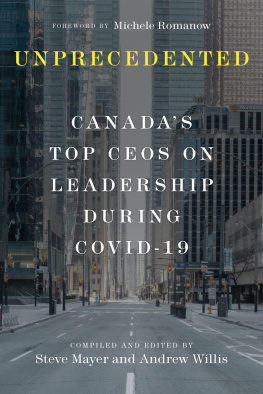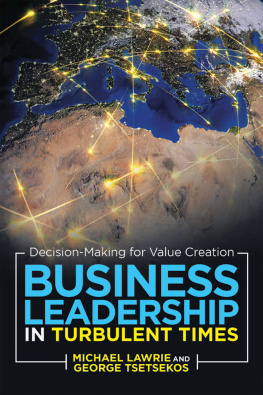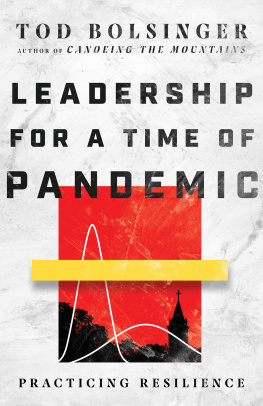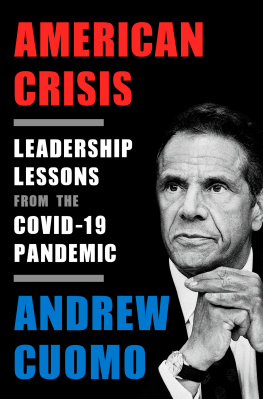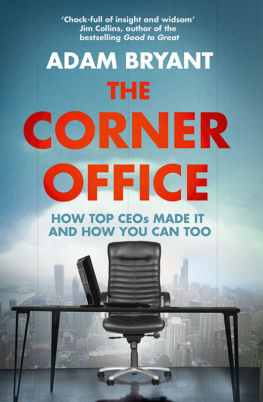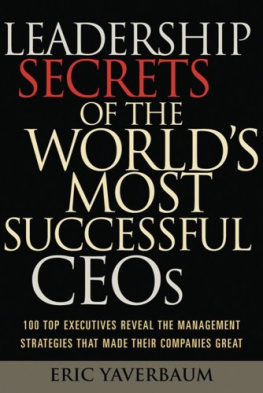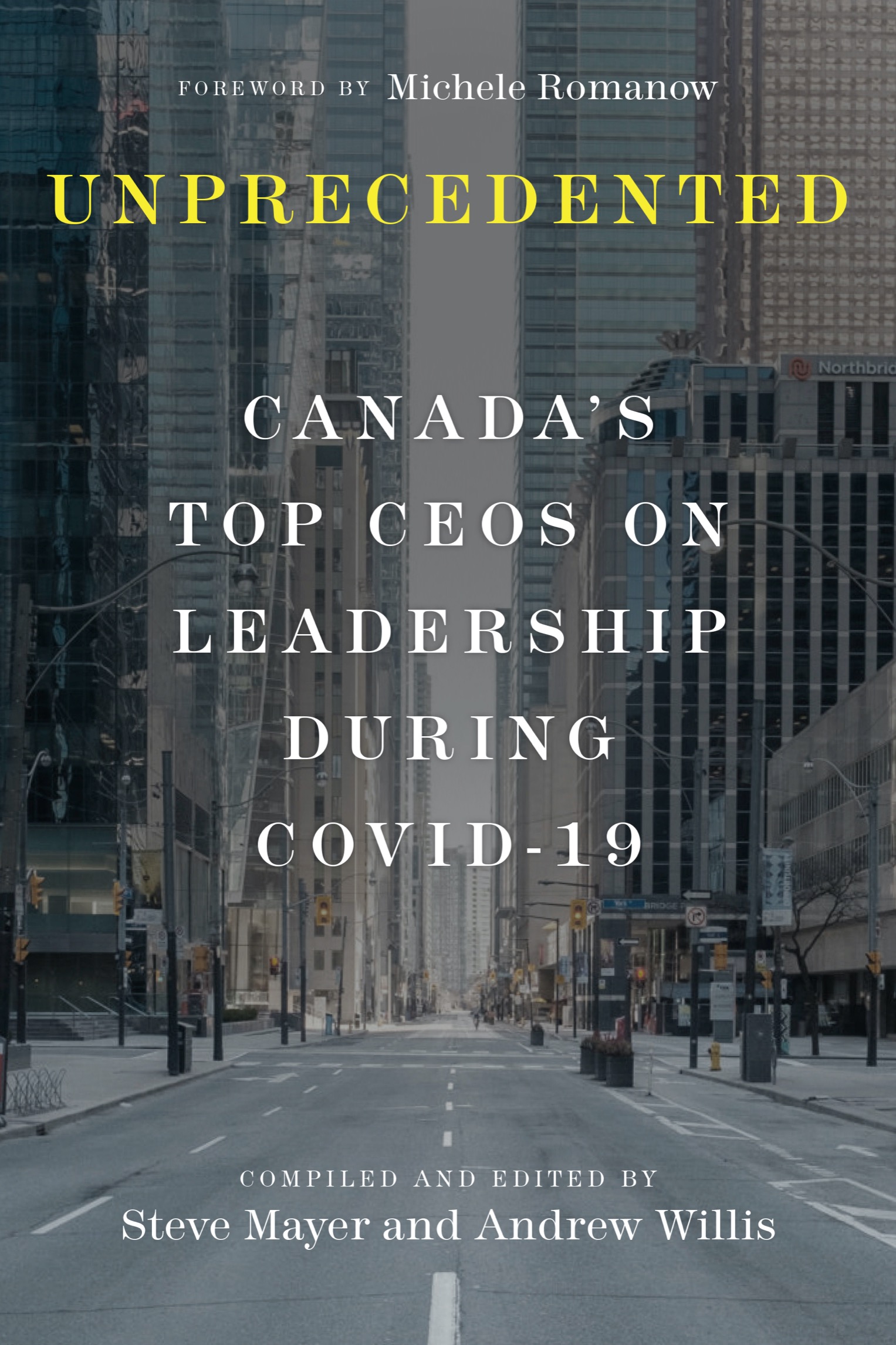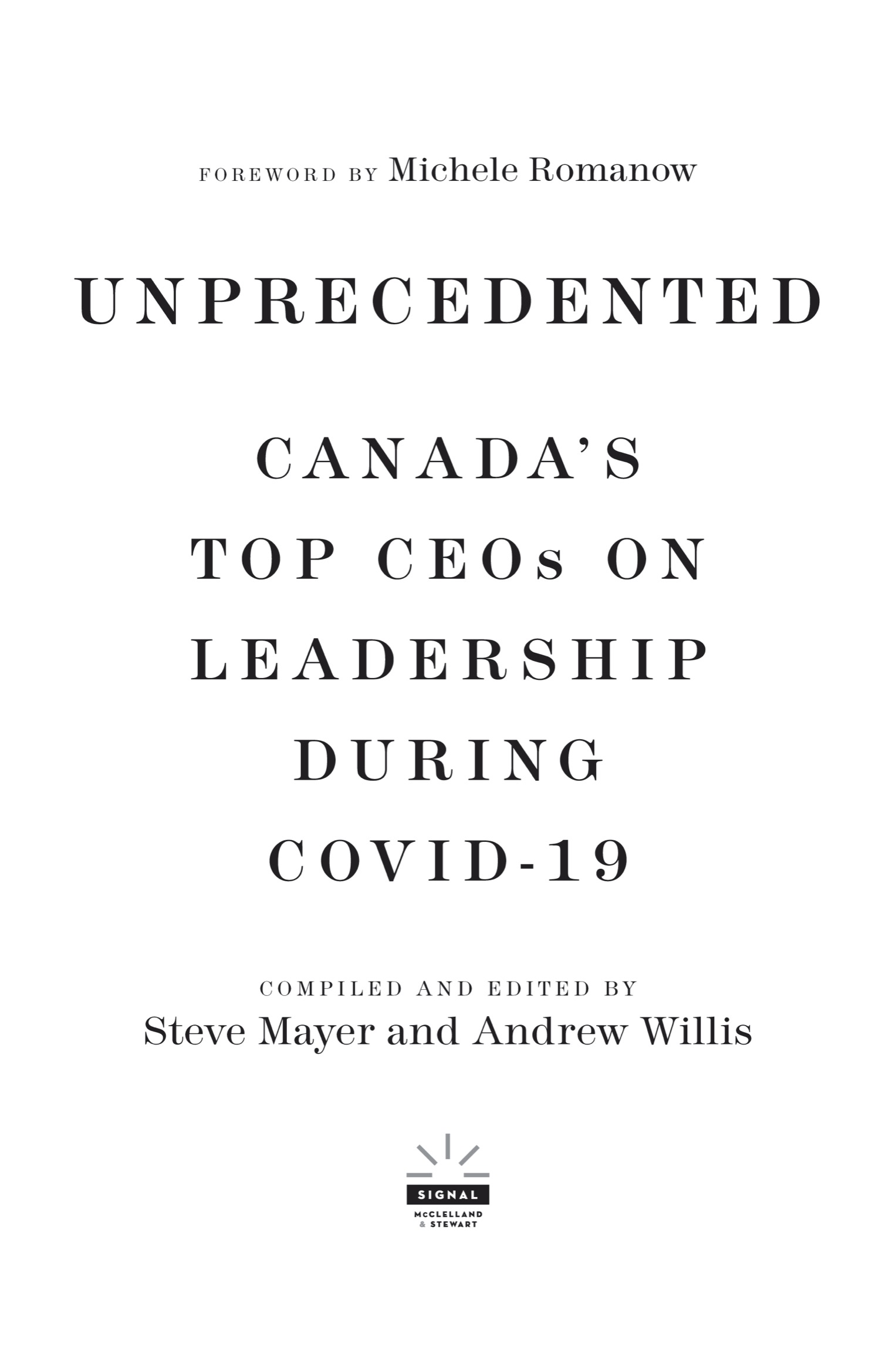Contents
Landmarks
Print Page List
Copyright 2022 by Covid Recovery Canada Inc.
Hardcover edition published 2022
Signal and colophon are registered trademarks of Penguin Random House Canada Limited.
All rights reserved. The use of any part of this publication reproduced, transmitted in any form or by any means, electronic, mechanical, photocopying, recording, or otherwise, or stored in a retrieval system, without the prior written consent of the publisheror, in case of photocopying or other reprographic copying, a licence from the Canadian Copyright Licensing Agencyis an infringement of the copyright law.
Library and Archives Canada Cataloguing in Publication
Title: Unprecedented : Canadas Top CEOs on leadership during COVID-19 / edited by Steve Mayer and Andrew Willis.
Other titles: Unprecedented (Toronto, Ont.)
Names: Mayer, Steve (Editor), editor. | Willis, Andrew, 1962- editor.
Identifiers: Canadiana (print) 20210391022 | Canadiana (ebook) 20210391138 | ISBN 9780771002137 (hardcover) | ISBN 9780771002144 (EPUB)
Subjects: LCSH: LeadershipCanada. | LCSH: Chief executive officersCanada. | LCSH: COVID-19 Pandemic, 2020-Economic aspectsCanada.
Classification: LCC HD57.7 .U57 2022 | 658.4/092dc23
Cover design by Matthew Flute
Cover art: senicphoto / stock.adobe.com
Published by Signal,
an imprint of McClelland & Stewart,
a division of Penguin Random House Canada Limited,
a Penguin Random House Company
www.penguinrandomhouse.ca

a_prh_6.0_139688702_c0_r0
We dedicate this book to the front line workers across Canada who carried us through unprecedented times, and continue to do so.
SM & AW
To my beautiful wife Alina. You are the foundation of our family and make every day fun and meaningful.
To our wonderful children who bring tremendous joy to our lives every single day:
Leora, Ian, and Emmie
Josh and Daphna
Jonah
Arielle
Abby
SM
To Jen, Hannah, and Rachel, who make everything worthwhile.
AW
CONTENTS
FOREWORD
For the past seven years, I have been proud to be part of the Dragons Den television series, showcasing entrepreneurs pitching for the money they need to achieve their dreams, from often-skeptical backers.
There is a tension on the show that makes for great TV. Contestants vie for life-changing investments in their businesses, while facing the fear of failure before their families, their friends, and a national audience.
Being an entrepreneur on the Dragons Den stage is an intense, stripped-down, pressure-packed version of the quest for capital that every founder faces when starting a company. If youre an entrepreneur who faces the spotlight on Dragons Den, you emerge from the experience a better business owner. Even if Dragons like me refuse to back your plans.
The pandemic, in my opinion, made us all contestants on Dragons Den. We all knew fear in the early days. We are all now coming out of COVID far stronger for the experience. The title of this book sums it upit was an unprecedented experience.
If you were a working Canadian during the first lockdowns in March 2020, you experienced something terrifying. In the space of a few days, COVID challenged the way we have done business for centuries. You couldnt meet a customer face-to-face, brainstorm with colleagues over coffee, or shake hands to close a deal. We all needed to adapt to surviveand fast.
Business leaders, including the CEOs who contributed their stories to this book, faced making critical decisions with little or no data. In a crisis, all eyes turn to the leader. Everyone expects the CEO to have the answers. Yet when COVID hit, no CEO had a game plan.
In my businessas Co-founder and President of artificial intelligence-based ecommerce investor Clearcodata is the heart of everything we do. Information informs all our actions. We crunch reams of statistics, every hour of every day, to invest more than $3 billion into 6,500 companies. In essence, this is true of what every good business leader doesyou gather all the available facts, and only then do you act.
That proven, logical approach went out the window when COVID came along. There just was no data on how to run a company during a global pandemic. Nothing weve experienced in the past served as a guide. We needed to figure out a new way to work. Leaders had to find different ways to inspire their shell-shocked teams.
The pandemic forced leaders of all stripesin business, government, health care, and educationto make decisions based on values. For CEOs, that meant considering the needs of customers, of employees, of all stakeholders, rather than simply focusing on the bottom line, on maximized profits.
The pandemic was (and continues to be) a brutal experience. We lost loved ones, friends, and colleagues. Everyone suffered to some extent. The most vulnerable members of our society, the aged and young people, shouldered the greatest hardships and made the greatest sacrifices. Businesses struggled, some failed.
Yet the pandemic also brought out the best in us.
I see Canada emerging from COVID as a stronger nation, with a clearer sense of where we need to raise our game if we want to hand over a better country to the next generation. I see our business leaders changed for the better, along with an economy that is more inclusive. In addition, I see enormous opportunities for entrepreneurs, the community that drives innovation and economic growth.
My own experience in the pandemic speaks to the journey that many of the leaders in this book experienced.
When the pandemic hit, we had an entirely office-based culture at Clearco. We had no work-from-home policies. Candidly, prior to March 2020, I would have said that if you were working from home, you werent really working. That most businesses, certainly ours, could not survive away from the office. That all changed in the months to follow, after we had to send everyone home. In contrast to what I expected, once we got everyone set up, our business thrived.
Entrepreneurs are our main client base. They needed our support more than ever, and we were there for them. From our home offices, we kept investing and during the pandemic, our team exploded from 150 to 500 employees. I have never met the majority of those 350 new colleagues face-to-face.
In my opinion, business leaders universally underestimated peoples ability to work remotely. The improvements in productivity we have seen during the pandemic show that going forward, companies can and should be flexible around how to structure their workplace. This is and can continue to be an incredibly important shift for women in the workforce, one that removes huge barriers to advancement.
During the pandemic, many women shouldered the burden of being both care-giver and wage-earner. It was a near impossible balancing act, one that brought stress and sacrifices, at home and in careers. Going forward, our goal should be a more equitable work force. The consulting firm McKinsey did a study that showed womens jobs were almost twice as vulnerable to the pandemic as mens jobs. Their research also found that if we strive for true gender parity, through digital inclusion, education, and childcare, we could add $13 trillion to global GPD by the year 2030. That opportunity should inspire all of us.

